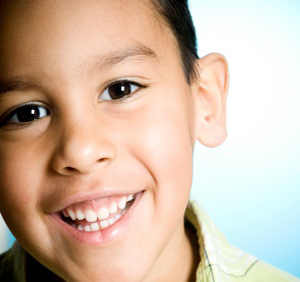Our baby teeth seem discolored. Should we be concerned?
Baby teeth, also called primary teeth, are typically off-white or ivory. Baby teeth can become discolored for many reasons, including:
- Inadequate brushing. If baby teeth aren't brushed properly, bacteria (plaque) may form on the teeth — which can lead to tooth discoloration.
- Medication use. Liquid supplementary multivitamins, which have been given to the toddlers, contain iron and this results dark stains on their teeth. Taking the antibiotic tetracycline during pregnancy can cause discolored baby teeth, too.
- Tooth or gum injury. Trauma to baby teeth or gums may give baby teeth a pink or gray tint.
- Weak enamel. A genetic problem with enamel formation may lead to discolored baby teeth.
- Excessive fluoride. Too much fluoride (fluorosis) may cause bright white spots or streaks on the teeth.
- Newborn jaundice. A baby who develops jaundice after birth may have baby teeth with a green tint.
- Serious illness. If a baby suffers from a chronic disease or high recurring fever, his teeth become discolored
If the discoloration is caused by inadequate brushing, more thorough brushing — using water and a small, soft-bristled toothbrush or the fingertip variety designed for infants — is likely to help. There's no need to use toothpaste until your child learns to
spit, usually about age 2 or 3.
If your child drinks from a bottle, remember that sipping milk or juice throughout the day or while falling asleep may lead to tooth decay. Don't let your child carry a bottle during the day, and don't put your baby to bed with a bottle — unless it contains a small amount of plain water.
In other cases, treatment options may include bleaching the discolored teeth or simply watching the teeth for signs of other problems. Discuss your concerns about your son's baby teeth with his doctor. He or she may offer a referral to a pediatric dentist.

Articles
2356
Home Visit Service
Your Baby checkup
Is my child developing normally?
what are the vaccinations that he should have taken until now?
Generate a report for my baby.
what are the vaccinations that he should have taken until now?
Generate a report for my baby.
Birthdate *
Track Your Baby Vaccinations
Receive reminders by email for the Vaccination timing
Find Your Baby name
Visit our Clinics
Mohandessin
Address
View Map
21 Batal Ahmed Abdel Aziz St, 3rd floor
Telephones
01002195777
01000012400
0233048350
Beverly Hills
Address
View Map
Beverly Hills, Building 29 services, behind Super Market Al Mokhtar, floor 1.
Telephones
01000012900
0238576831
El Tagamo3
Address
View Map
Elegantry Mall, Unit 221
Telephones
01000012800
01000884592
Al Sheikh Zayed
Address
View Map
Al Sheikh Zayed - Entrance 2,Downtown Mall - In-front of Spectra ,First Floor - Clinic 113
Telephones
02- 38514031
01000608597
Please enter your e-mail


